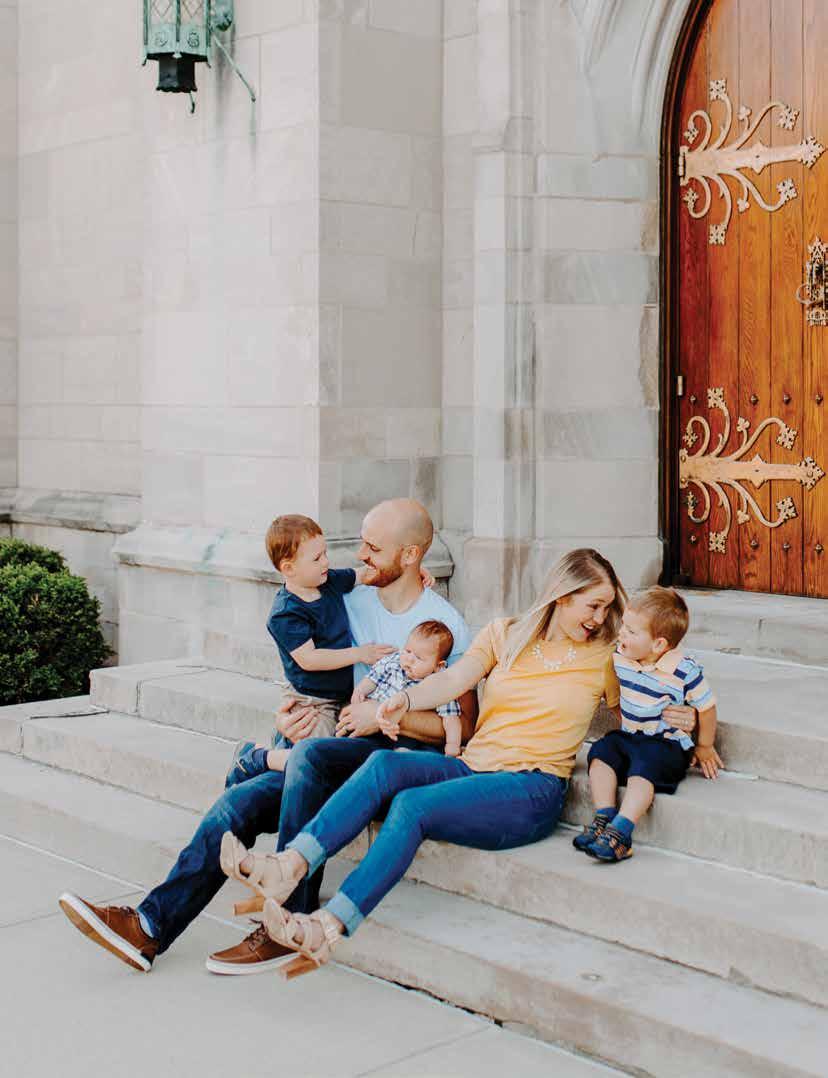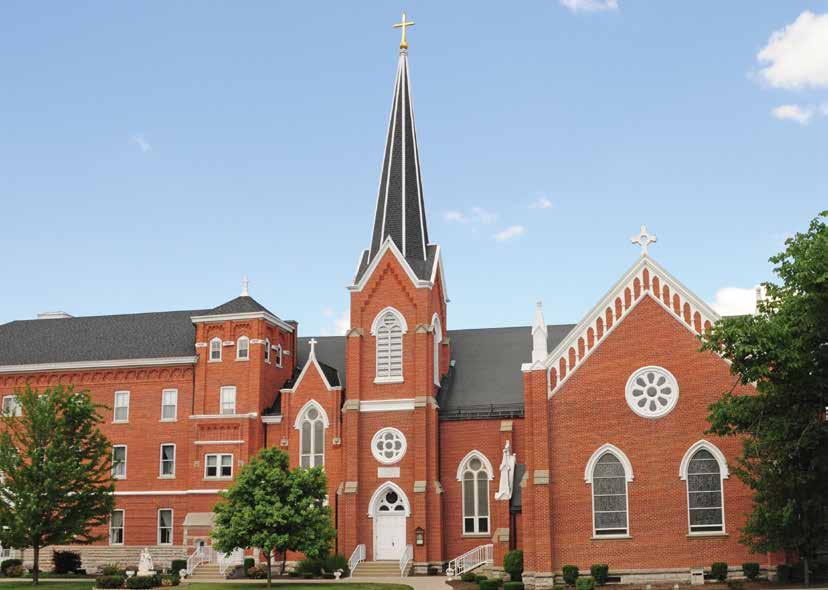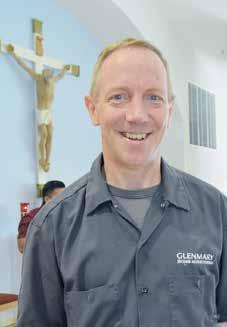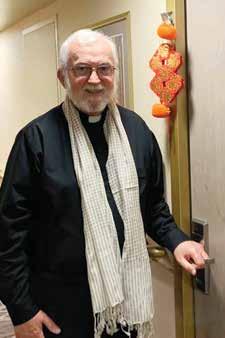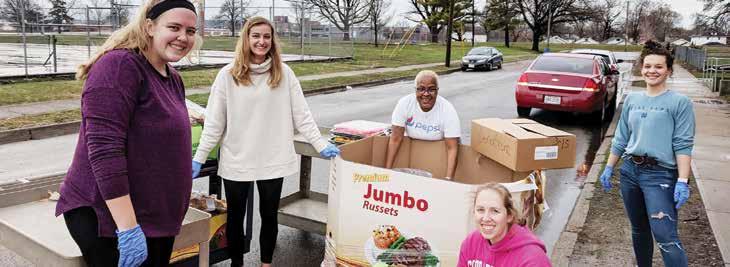
7 minute read
A CLOSER LOOK
A CLOSER LOOK SAY HELLO IN THERE, HELLO
Social distancing in my family, with six children at home, has been less about loneliness and more about trying to find a place in the house to be alone. While, of course, there are challenges, my days of “isolation” have been filled with all sorts of interactions (and distractions) with my wife and children. We feel a little claustrophobic at times, but no one feels lonely. Even though we have begun to relax some social distancing restrictions, the pandemic has presented profound challenges for people who live alone.
Advertisement
Recently I interacted with two such people. They are both strong, intelligent, independent professionals, who are used to living alone in normal times. “Normal,” of course, means workdays, dining out, going to the gym and the many other interactions in a typical day or week. Both of them described, in remarkably similar terms, how very difficult social distancing has become for them. Neither is given to self-pity, but both made me realize how qualitatively different these times are for those who live alone.
CULTIVATING MORAL IMAGINATION I often tell my students that the Catholic moral life is not primarily about keeping lists of rules, or obeying commands. Rather, it is about cultivating the virtues that help us to both order our lives properly toward love of God and one another. Virtuous people will obey commands; but obeying commands does not necessarily mean that the person is virtuous. We might make the right moral choice, for example, but be motivated by fear or greed, or some other base incentive. Or our good moral actions might be nothing more than luck or ignorance. In these cases, we cannot properly say that we have acted “morally” even if, incidentally, we have chosen a moral good. This is why training in virtue is such an important part of the moral life.
In other words, Christian moral theology is about learning to expand and exercise our moral imaginations in such a way that we have the moral creativity to address challenges and issues that we cannot anticipate, and never expect to encounter. Learning new forms of hospitality and solidarity in this time of pandemic can be such an exercise. This virus has come as a form of challenge to us, not simply to observe directives, but rather to turn our attention to issues and problems that none of us ever could have envisioned – issues that resist categorization as demands or obligations, but nonetheless call us to moral responses. Among them is the challenge of supporting those who live alone, or who otherwise suffer isolation and loneliness.
In his extraordinary Urbi et Orbi (To the City and the World ) address on March 27, Pope Francis challenged us to cultivate and exercise our moral imaginations so that we can respond properly to the loneliness and isolation around us. “The Lord asks us and, in the midst of our tempest, invites us to reawaken and put into practice that solidarity and hope capable of giving strength, support and meaning to these hours when everything seems to be floundering. The Lord awakens so as to reawaken and revive our Easter faith. . . . The Lord asks us from His cross to rediscover the life that awaits us, to look towards those who look to us, to strengthen, recognize and foster the grace that lives within us.” By doing this, by “embracing His cross,” the Holy Father continues, we may “find the courage to create spaces where everyone can recognize that they are called, and to allow new forms of hospitality, fraternity and solidarity.”
The friends I described are strong, capable people; yet they are feeling a depth of loneliness that, I think, surprises them both. Think even more of others living alone who are not as sufficient, who are psychologically or emotionally vulnerable. If you know such people, think about taking some time to reach out to them by text, phone or FaceTime. Sometimes we just need a little company to experience “new forms of hospitality, fraternity and solidarity.”
On April 7, 2020, the great singer/songwriter John Prine passed away from COVID-19 infection. More than 40 years ago, in his lovely, sad song, “Hello In There,” Prine wrote about an aged couple, whose children are either dead or moved far away. What he said about these characters applies to all people who are alone in this time of loneliness and isolation: “So if you’re walking down the street sometime/And spot some hollow, ancient eyes/ Please don’t just pass ’em by and stare/As if you didn’t care, say, ‘Hello in there, hello.’”
DR. KENNETH CRAYCRAFT is an attorney and the James J. Gardner Family Chair of Moral Theology at Mount St. Mary’s Seminary & School of Theology. He holds a Ph.D. in moral theology from Boston College, and a J.D. from Duke University School of Law.
SEIZE THE MOMENT WHO ARE YOU, REALLY?
Before I started working for the Church, I was a counselor. Sometimes I would ask my clients to complete an “I am” statement: “I am ____.”
It’s amazing how varied the answers can be: I am worthless. I am hopeless. I am unlovable. I am a failure. Each one is a lie that must be overcome before our thoughts can lead to right action, before we can radiate Christ.
WHAT DOES GOD SAY? Christians often say, “I am a sinner.” I think we say it out of a false sense of humility, or to make ourselves feel better about our sins. But, how does God complete our “I am” statements? Let’s see what Scripture says.
In Genesis, Chapter 1, as God creates, He also evaluates His creation. He creates light and says it is good. He creates land, sea, sky and their inhabitants and says they are good. But, when God creates man and woman, He makes a new declaration: “It is very good.” (vs. 31)
Now, we might object and say that all creation lost its goodness once Adam and Eve committed the original sin. But then how do we explain God’s good assessment of creation well after the Fall? For example:
“Yet thou hast made him little less than God, and dost crown him with glory and honor” (Psalms 8:5).
“We are his workmanship, created in Christ Jesus for good works” (Ephesians 2:10).
And the clincher: “For everything created by God is good” (1 Timothy 4:4).
WHY YOU ARE GOOD The fact is, man is good. Scripture clearly says so. But, how can this be? How can we be good if we sin so much? I’ve spent a lot of time reading and praying about this. While it hasn’t been easy, it has been fruitful, and I think I’ve found a solution.
Here are least five reasons why you are good: 1. Because God created you, and He is good. Nothing evil comes from perfect goodness. 2. Because God desires you, and as Aquinas says, “The essence of goodness consists in this, that it is in some way desirable.” 3. Because God loves you, and as the Catechism says, “Only the good can be loved.” (CCC 1766) 4. Because you are ordered towards goodness. Goodness is your beginning and your end. 5. Because you are made in the image and likeness of God. You were made to resemble God, and He is good.
Note that when I say, “You are good,” I’m not referring to the quality of your actions. Instead, I’m making an identity statement. I’m talking about who you are at the core of your being. Sin darkens your intellect, weakens your will, and strains your relationships. But, it is not who you are.
Your actions don’t define you. How could they? Does breathing under water make you a fish? Does flapping your arms make you a bird? Do a million pious actions make you a saint? No. Similarly, sinning does not make “sinner” who you are.
Yes, you have the ability to sin, but sinning is still just as unnatural to you as is breathing under water. You weren’t made for sinning, you were made for communion with God!
BE WHO YOU ARE If you’re still struggling with this, ask yourself: Who would want me identifying with my sinfulness? Who would want me always thinking, “I am a thief. I am an adulterer. I am a glutton”? Satan would.
Now, ask Jesus: Who do you say that I am?
I know, we sin every day. But, if we can identify with our “very goodness,” then sin will no longer define us or have the final say. The next time we are tempted to sin, we can say, “I am not made for this!” Then we can live in the truth of who we are.
And the truth will set us free.
NICHOLAS HARDESTY creates content and leads workshops for Contagiously Catholic, an archdiocesan initiative that seeks to empower parishes and schools to equip the laity for evangelization. nhardesty@catholiccincinnati.org

